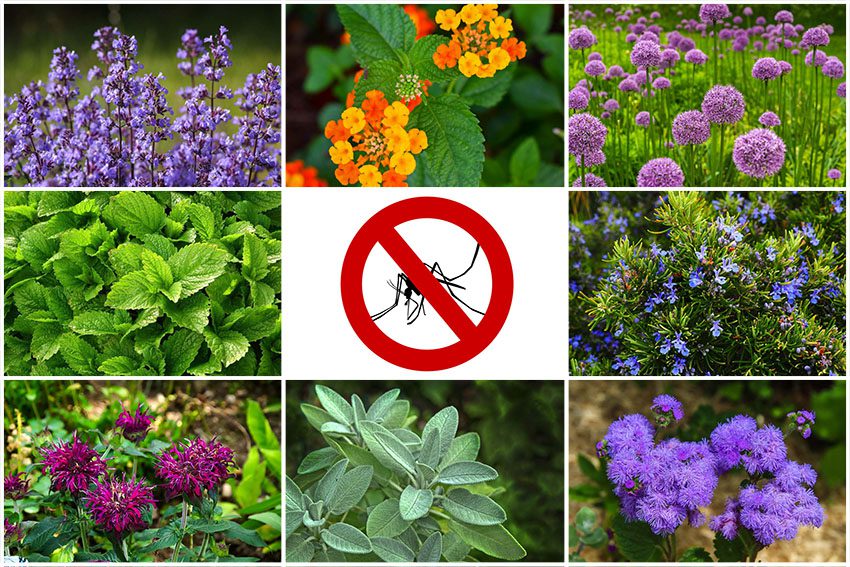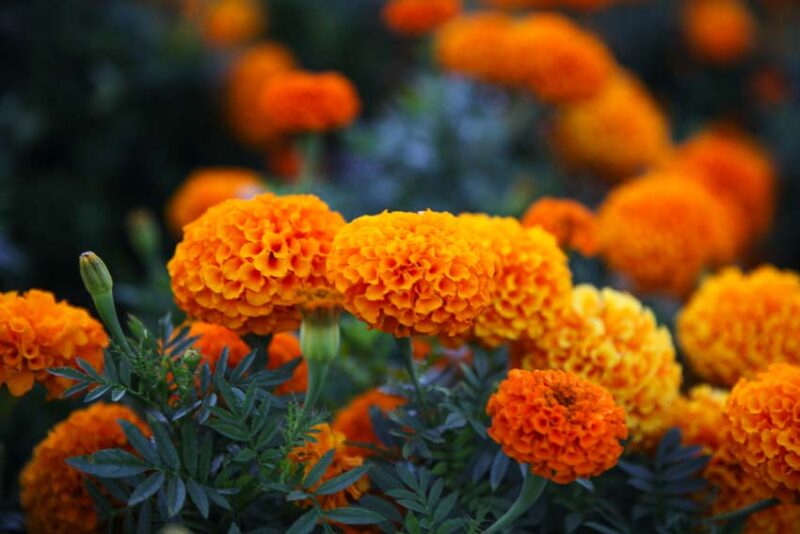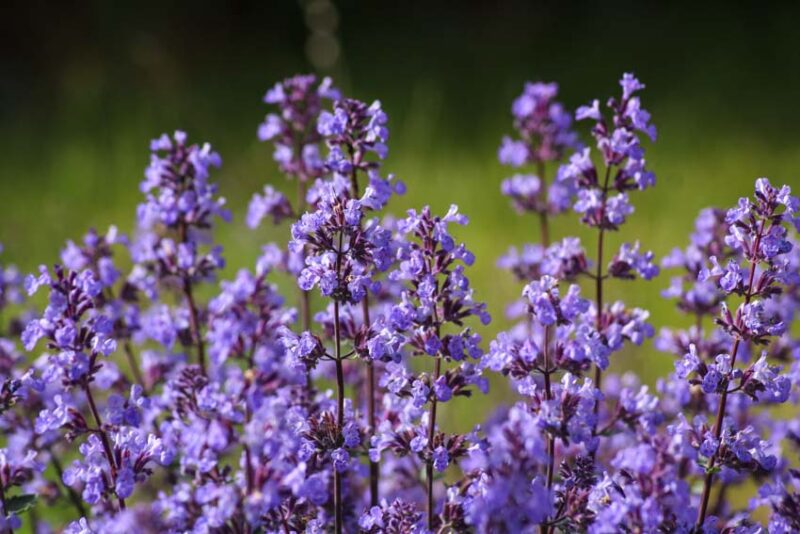What Plants Repel Mosquitoes While Adding Visual Appeal, Scents, or Flavor
It doesn’t take a degree in biology (though I happen to have one) to research plants that repel mosquitoes naturally. We focus a lot on outdoor power equipment, but ultimately that reflects our love of the outdoors and outdoor spaces. As it turns out, certain plants serve as living tools to naturally repel and keep away mosquitoes. The amazing thing is that many of these types of plants are also attractive. Several have wonderful scents, and others can end up in your favorite recipes .
Table of Contents
- What Plants Repel Mosquitoes While Adding Visual Appeal, Scents, or Flavor
- How to Use Plants That Repel Mosquitoes
- What Plants Repel Mosquitoes and Smell Great
- What Plants Repel Mosquitoes and Look Good in Your Garden
- What Plants Repel Mosquitoes and Add Flavor to Your Kitchen
- What Other Plants Repel Mosquitoes and Flies
Interested in treating your yard for ticks? Find out how to use landscaping to control these disease-carrying parasites. And make that landscaping dog-friendly!
How to Use Plants That Repel Mosquitoes
By nature, many plants give off some sort of scent that attracts bees, butterflies, and hummingbirds when they flower. This brings those creatures to harvest their sweet nectar and help the pollination process. The scents of these plants don’t connect directly to what repels mosquitoes. As it turns out the oil present in the leaves of the plant tackles this.
To access this natural mosquito repellent, you would crush the leaf between your fingers and dab the oil on your neck, wrists, and legs. Of course, some of the plants on our list are also toxic. Be sure you don’t eat any of those oils or let them near your mouth. You should also watch out for anything that might stir up any allergies you may have. Start small and test your skin to ensure you don’t have a reaction. Be sure to consult a doctor if you suspect you may have any dangerous allergies.
As these oils repel mosquitoes naturally, you can also dab or wipe the oil on clothing. You can also test on a hammock or clothing or anything you might be sitting on.
What Plants Repel Mosquitoes and Smell Great
Lavender (Zone 5 – 11, Depending on Variety)

Lavender drives away mosquitoes as well as a variety of other garden bugs. It possesses a very soothing and relaxing scent that I love. The fact that this plant repels mosquitoes remains a simple bonus.
Lavender has silvery green leaves that run up its stalk alongside purple flowers. I find lavender an attractive perennial plant that elevates a lot of landscaping. It blooms throughout Summer and Fall. You can find multiple varieties that work across a large portion of the United States.
Summary: Lavender serves as a drought-resistant mosquito repellent that thrives in full sun but requires excellent drainage.
Eucalyptus (Zones 8 – 11)
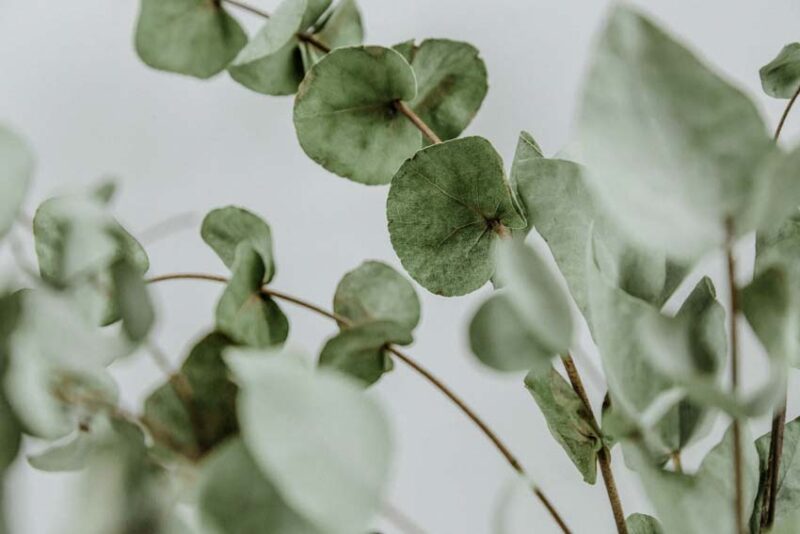
Many folks use Eucalyptus in floral arrangements. It produces a widely-used essential oil that smells great. It resembles a menthol, so if that offends your nose you might want to skip it! We love that it also gets rid of mosquitoes!
Eucalyptus belongs to the myrtle family. This fast-growing plant features blue-green leaves, making it an attractive indoor or outdoor element. Since the Eucalyptus tree can grow up to 30 feet, keep it well-pruned to keep it from getting out of hand.
Summary: The eucalyptus tree prefers full sun and well-drained soil. While drought-tolerant, it needs regular watering to stay healthy. Potted plants really need liquid fertilizer every few weeks to stay healthy. If you grow eucalyptus outdoors you can avoid fertilizer once you get the plant established.
What Plants Repel Mosquitoes and Look Good in Your Garden
Marigold (Zones 2 – 11)
We don’t prefer the scent of marigolds as much as we do many of the other plants that repel mosquitoes on our list. Still, mosquitoes hate this plant and that makes us happy! Also, marigold also repels a large number of other bugs. These plants grow easily and you can grow them across a large portion of the United States.
With bright (typically) orange flowers, marigolds make for a beautiful annual. They do very well growing either in the ground or in pots. Marigolds typically bloom throughout the Summer until the first frost of the year.
Summary: Give marigolds full sun and let the soil dry out between waterings.
Catnip (Zones 3 – 8)
Both catnip and catmint repel mosquitoes with a high level of effectiveness. The leaves contain something called nepetalactone. Studies show this plant is over ten times more effective than DEET at repelling mosquitoes! Repelling cats…not so much.
Catmint features a tall, thin profile with bright green leaves and lavender-colored flowers while catnip has white flowers. Unfortunately, we can’t really grow catnip in Central Florida. If you find you can, these hearty perennials tend to take over flowerbeds. If you want to keep them contained, you need to keep your eye on them.
Summary: Plant catnip and catmint in full sun. Let the soil dry between waterings and expect it to bloom from early Summer through Fall.
Monarda (Zones 4 – 8)
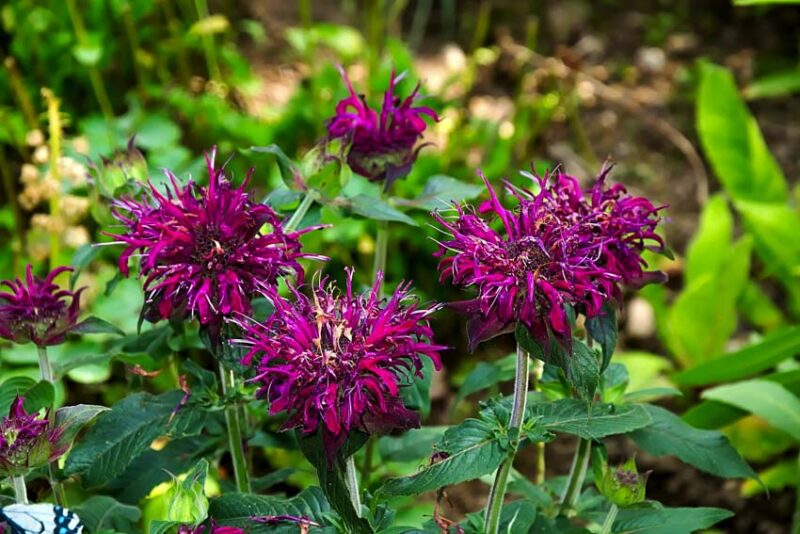
Monarda (also bee balm, horsemint, and wild bergamot) is a pretty perennial that also attracts bees, butterflies, and hummingbirds. For some reason, it also tends to repel mosquitoes. Bonus!
The pretty red, purple, pink, or white flowers emerge in bloom. This plant can grow 2 to 4 feet tall, so it falls on the larger size. Some use the oil in the mint, oregano, and sometimes citrus-scented leaves to make tea.
Summary: Monarda needs good air circulation to avoid powdery mildew issues. Use evenly moist soil to keep it blooming through late Summer.
Allium (Zones 4 – 9)
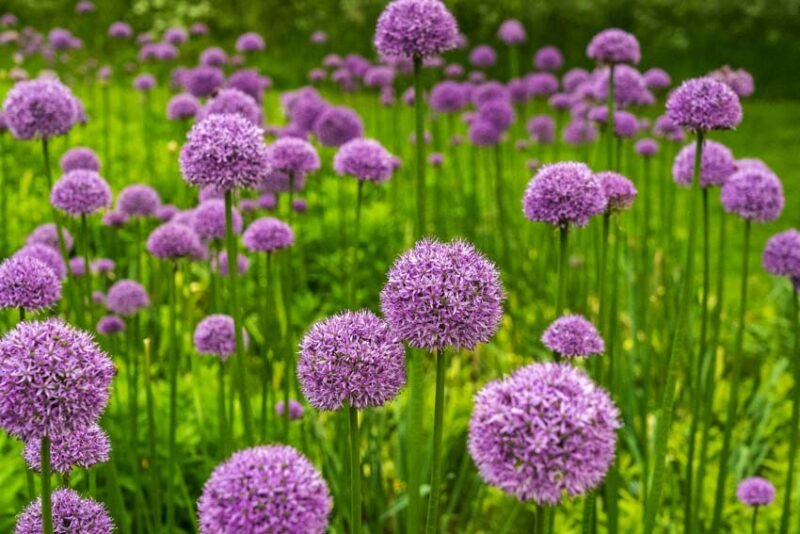
Allium is a close relative to the onion, so it may not surprise you that this plant repels mosquitoes!
Featuring a long, thin stalk that terminates in a colored puffball of flowers, this plant looks great. Depending on which variety you buy, you can get them in blue, purple, red, white, pink, or even yellow. The thin profile makes this an attractive plant. It can serve as an accent to others by rising above lower plants while still letting in sunlight.
Summary: These tough, drought-resistant bulb-based perennials like full sun with well-drained soil.
American Beautyberry (Zones 7 – 11)
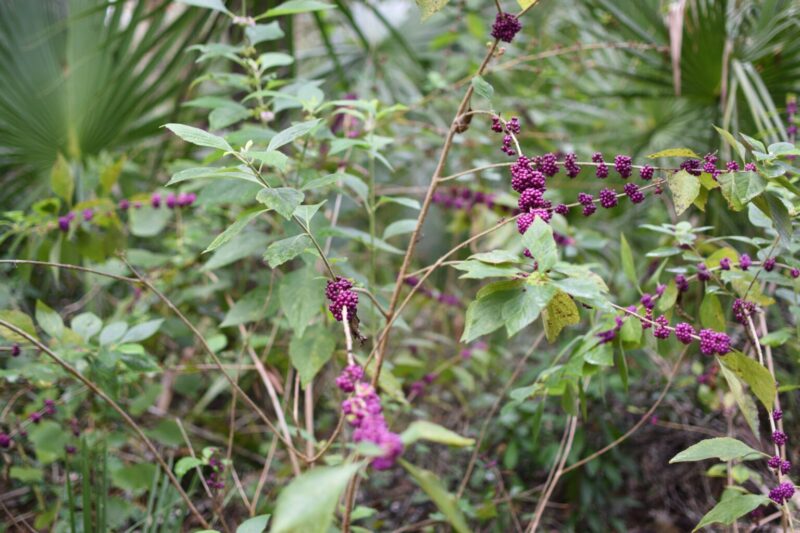
The American beautyberry is one of the larger mosquito-repelling plants on our list. A deciduous shrub, the American beautyberry grows up to 6 feet high and equally wide.
It features small purple berries that straddle the stalk. They show up in the Fall and Winter months, adding color to your garden after the late Spring and early Fall blooms. Whitetail deer apparently love to munch on these plants, so use them if you want to attract some to your yard.
Summary: Plant American beautyberry in partial shade where it has rich, moist soil.
Lantana Camara (Zones 7 – 11)
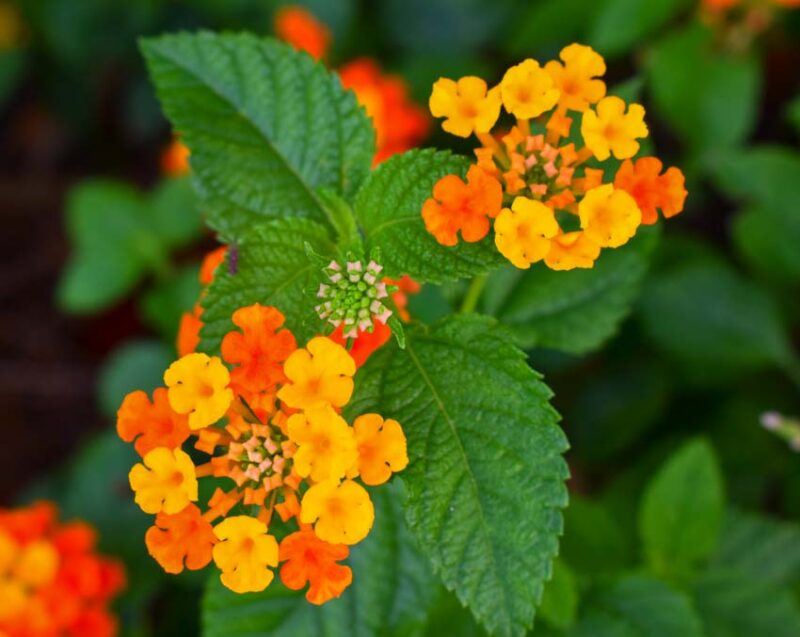
We have a lot of Lantana Camara here in sub-tropical Florida. It functions as a handy mosquito-deterrent all the way down to zone 7. In zone 8 and lower it’s an annual, but in zone 9, it serves as a perennial.
As it grows larger, the stalks become rather woody. The flowers of the Lantana Camara have this really distinct umbrage. You also often get two different, but related, colors in each bundle. Sniff these flowers and you come away with an aggressively citrus scent. Some people don’t like it, but even if you don’t like to smell these flowers, they look fantastic!
Summary: Lantana loves full sun and well-drained soil. It’s happy in the ground or in a container.
Ageratum (Zones 9 – 10)
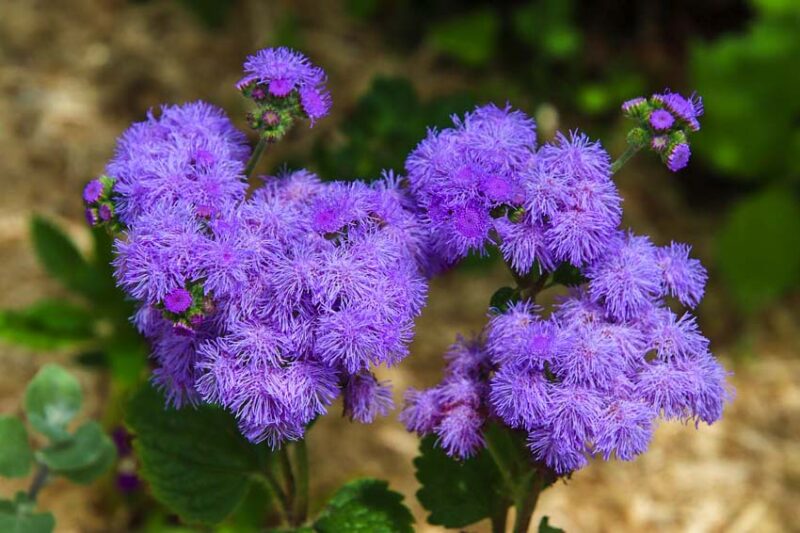
Some people refer to Ageratum as “floss flower”—possibly due to its delicately-thin flowers. Ageratum contains a chemical called coumarin—it just so happens to repel mosquitoes.
As annuals with beautiful purple blooms, Floss flowers bloom from the time you plant them all the way to the first hard frost of the year.
Summary: Ageratum prefers partial sun in warmer zones and likes well-drained, but moist soil. It’s also toxic to humans and pets, so be judicious when you decide to use it.
Lemon Geranium (Zones 9 – 11)
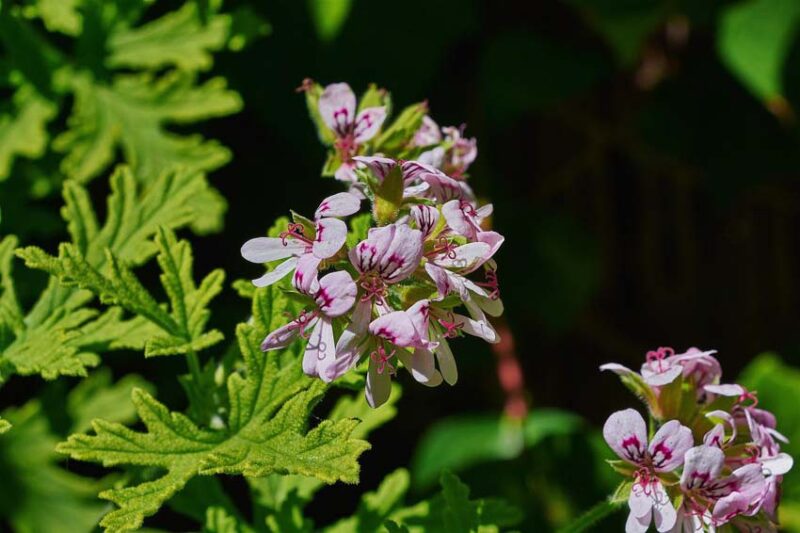
Not all geraniums repel mosquitoes equally. You want to carefully choose which variety you use. Those which have a citrusy lemon scent are typically the most effective.
Looking at lemon geranium, in particular, you’ll find a classic geranium leaf with light purple to pink flowers. Each contains a pistil that splits and coils like a firework. You can also grow these plants in almost any sort of container from basic pots to window boxes.
Summary: Lemon geranium needs full to partial sun and protection from the midday sun in warmer zones. Stick with soil a little on the drier side and fertilize sparingly.
Lemongrass (Zones 9 – 11)
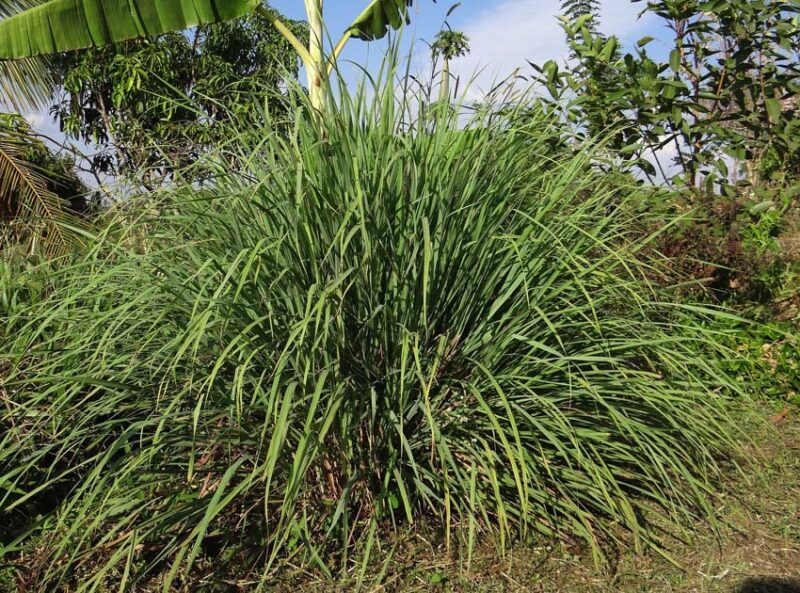
Lemongrass, also called citronella grass, is one of those plants that help repel mosquitoes in the southern parts of the United States. You can also find it used in many kitchens, particularly in Asian-inspired dishes. With a clean scent and fresh taste, for some reason, mosquitoes and many other pests tend to stay away.
Lemongrass grows in large grass clusters. You can plant it as a perennial, but often people use it as an annual. This is another plant that’s content to live in a pot as well. Watch out where you place lemongrass, however. It tends to keep on growing and so you can end up with a very large plot of it before too long!
Summary: Plant lemongrass in full sun and don’t be afraid to hit it with fertilizer, especially if you’re going to perennial use. Give it some room to grow!
What Plants Repel Mosquitoes and Add Flavor to Your Kitchen
Lemon Balm (Zones 3 – 7)
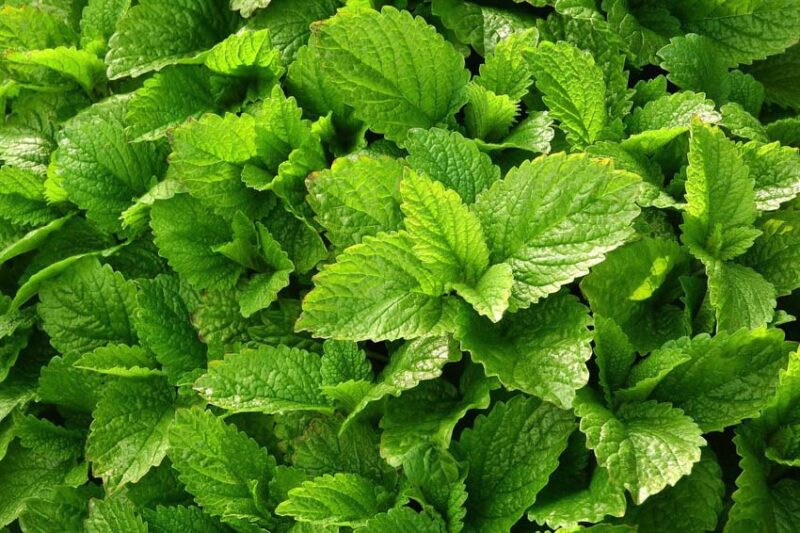
We love lemon balm. It annoys mosquitoes, but you can see it used almost everywhere—from the kitchen to home remedies. The mild lemon flavor also gives off a rather calming aroma.
This herb belongs to the same family as the mint. As a rather plain plant, it won’t add much to your landscape aesthetics. Rather, put it in your herb garden or plant it in a container (indoors or out). If you grow lemon balm in its optimal conditions, it’s a hardy perennial.
Summary: When you grow lemon balm indoors, try to get it in a spot where it receives 5 to 6 hours of light. Outdoors, partial sun works best. Try to avoid the harshest rays in the middle of the day. It prefers well-drained soil that’s a little on the sandy side and lets the soil dry between watering.
Peppermint (Zones 3 – 8)
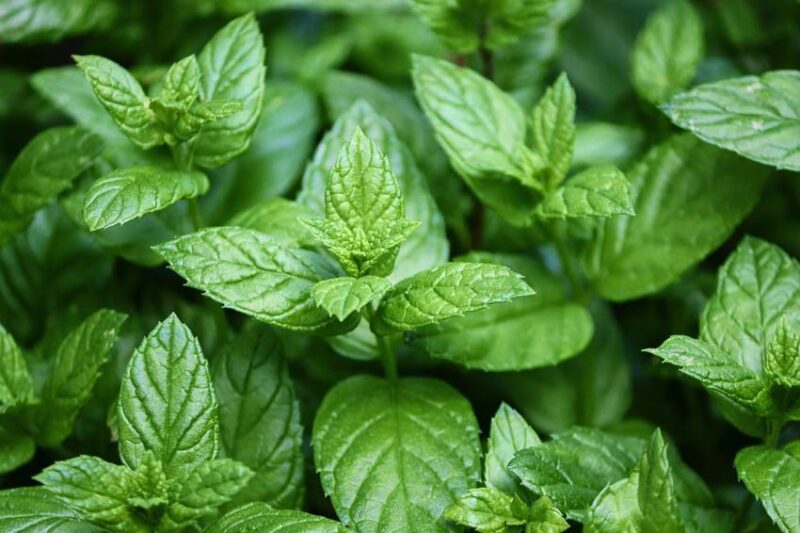
I love peppermint. Even better—this plant mixes up mosquito-free living and great taste!
Typically used for its ability to provide great flavor to drinks and dessert dishes, peppermint has limited aesthetic appeal for landscaping. Also, planted in zones where it thrives, peppermint can quickly spread and take over. The best practice is to keep this perennial in a container.
Summary: Peppermint prefers partial shade and moist soil conditions. Keep it contained or it might overwhelm its surroundings.
Fennel (Zones 4 – 9)
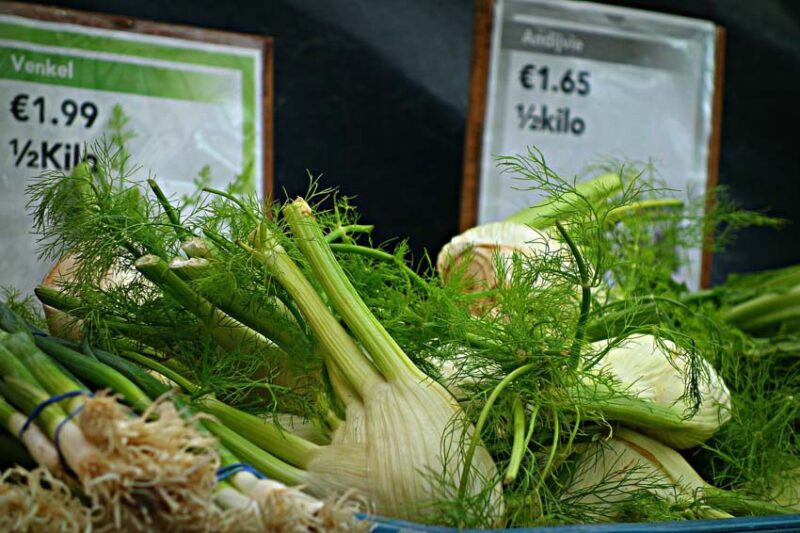
Fennel, another plant (or vegetable?) that I love. You often find this bulbous veggie in Italian dishes. Related to the carrot, it’s not a root vegetable. You can use almost every part of this plant in the kitchen. Did we mention that it also repels mosquitoes? Bonus.
Fennel has celery-like stalks that form a bulbous section at the base. It doesn’t look great or smell great, but it has a mild anise (licorice) flavor. Use it to add something to dishes you plan to serve outdoors and you have a built-in mosquito repellant.
Summary: A perennial in zones 4–9 and possibly as an annual outside of it, fennel likes rich soil that drains well. Plant it where it gets at least 6 hours of sun. Use a liquid fertilizer during seasons where you harvest its leaves.
Sage (Zones 5 – 8)
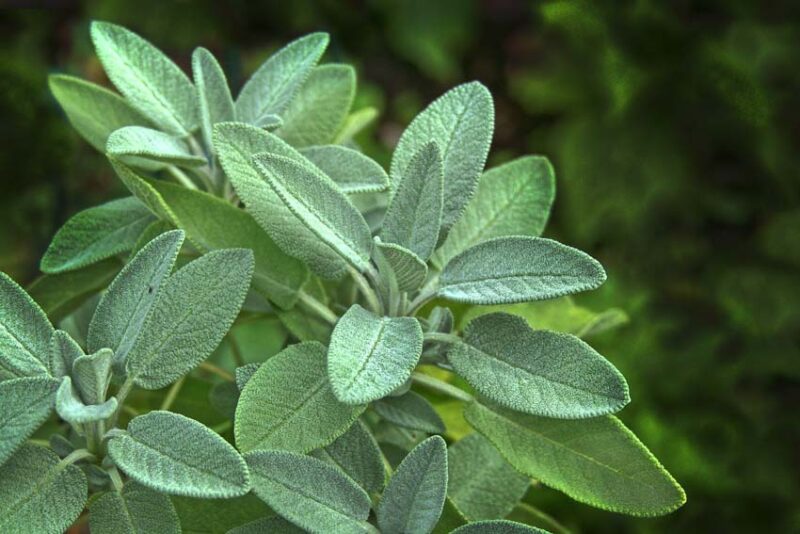
If you live in zones 5–8, you get the blessing of sage. Planted indoors or out, this is one of those perennial plants that does well to repel mosquitoes. Sage can live in zones 9 and 10 (barely), but it functions as an annual there rather than a perennial plant.
With a silvery green leaf, it has an unusual and interesting color that can accent flowerbeds. You also find a lot of sage used in Mediterranean dishes.
Summary: Sage is pretty versatile, preferring full sun in well-drained soil. It’s also happy in pots. You can even grow it as part of a hydroponic system.
Lemon Thyme (Zones 5 – 9)

In case we haven’t been totally clear yet—mosquitoes seem to dislike lemon. Lemon thyme is another kitchen-friendly plant to add to your arsenal. With versatility in how you plant and grow it and an interesting leaf structure, you get a lot more landscaping options than most other “edible” plants.
Growing just 6–12 inches in height and 12–18 inches wide, lemon thyme works really well as a groundcover. It features small bright green leaves and you get tiny light purple flowers when it blooms. Covering zones 5–9, it serves as a perennial in zones 7–9.
Summary: Give lemon thyme full sun and well-drained soil that dries between waterings. It provides a citrus and savory accent to many dishes.
Rosemary (Zones 7 – 10)
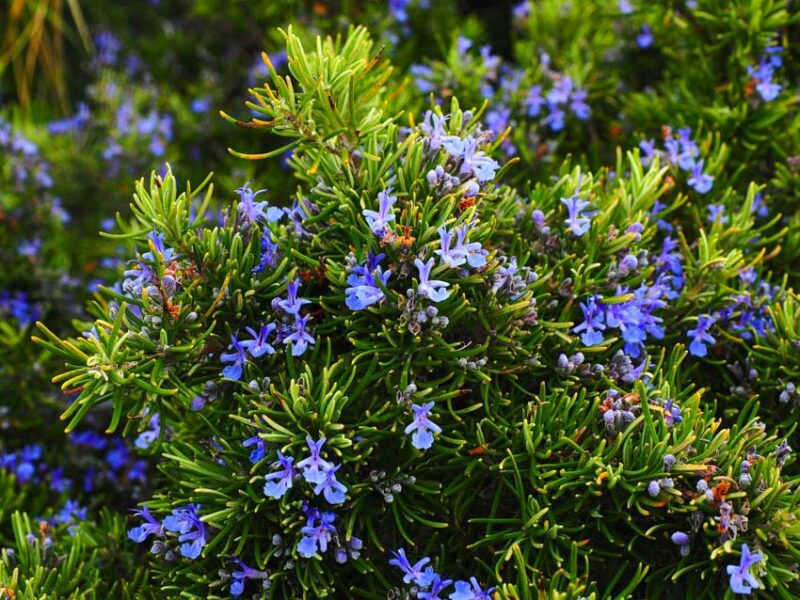
Rosemary tastes great, looks great, and repels mosquitoes…it’s basically a miracle plant. With a woody fragrance, this plant does triple duty in landscaping and herb gardens.
Rosemary’s silvery green leaves are reminiscent of lavender in structure. Also like lavender, it blooms a purple flower that looks fantastic.
Summary: This plant prefers hot, dry conditions and works really well in containers. No matter how you decide to plant it, give this perennial full sun and ensure the soil drains very well.
Basil (Zones 10 – 11)
Another heavy-hitter in the kitchen, basil is an effective plant for repelling mosquitoes. You can only grow it in warmer climates, however.
Basil has a rather plain appearance. With bright green leaves, it tastes much better than it looks. Once basil produces flowers, it stops producing new leaves. Be sure to remove buds when they pop up if you want continued growth.
Summary: Like rosemary, basil wants lots of sun. It also prefers moist soil with good drainage, so don’t plant rosemary and basil in the same container.
What Other Plants Repel Mosquitoes and Flies
Citronella (Zones 9 – 11)
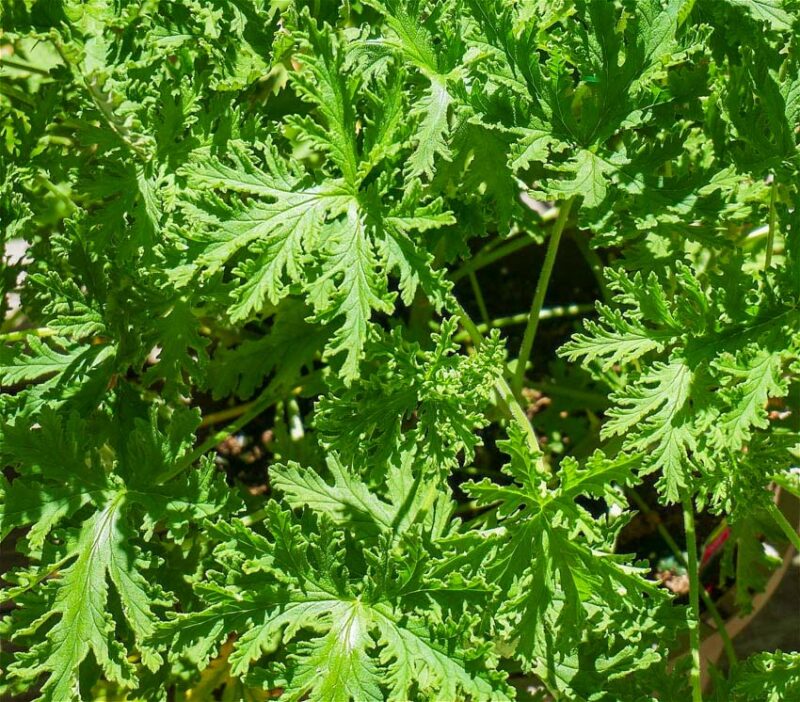
Have you ever used a citronella candle? Citronella plants have the same mosquito-repelling benefits and that distinct scent those bloodsucking bugs hate. Also known as the mosquito plant or lemon geranium, citronella may be one of the most notorious plants to repel mosquitoes. It’s a great choice for warmer climate zones.
Citronella (Pelargonium citrosum) is a member of the geranium family and is closely related to the lemon geranium (Pelargonium crispum). Both its basic structure with a classic geranium leaf and pinkish/purple flower look very similar.
Summary: Citronella does best in full to partial sun. It needs protection from the midday sun in the warmer zones. It likes soil a little on the drier side and needs only light fertilizing.
Pennyroyal (Zones 6 – 9)
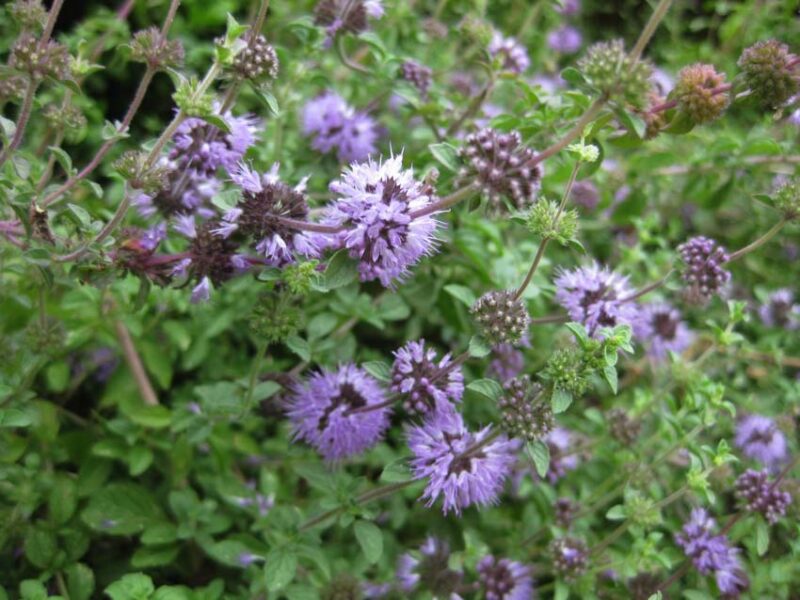
Our final plant, Pennyroyal, repels mosquitoes but also comes with a stark warning. This plant is toxic and capable of causing organ failure and death if you ingest it. Be VERY cautious if you’re going to grow it in an environment kids and/or pets can easily access.
Surprisingly, pennyroyal belongs to the mint family. It has that classic square mint stalk. Its light purple flowers emerge in bundles and straddle the stalk. Crush the leave and it emits a pleasant spearmint scent. The toxicity of that oil in concentrated doses makes some hesitate to use it on their skin as a perfume.
Summary: If you decide to use this toxic plant, pennyroyal takes full to partial sun. The big thing is that it loves moist soil. Keep it wet but make sure the soil drains well.

